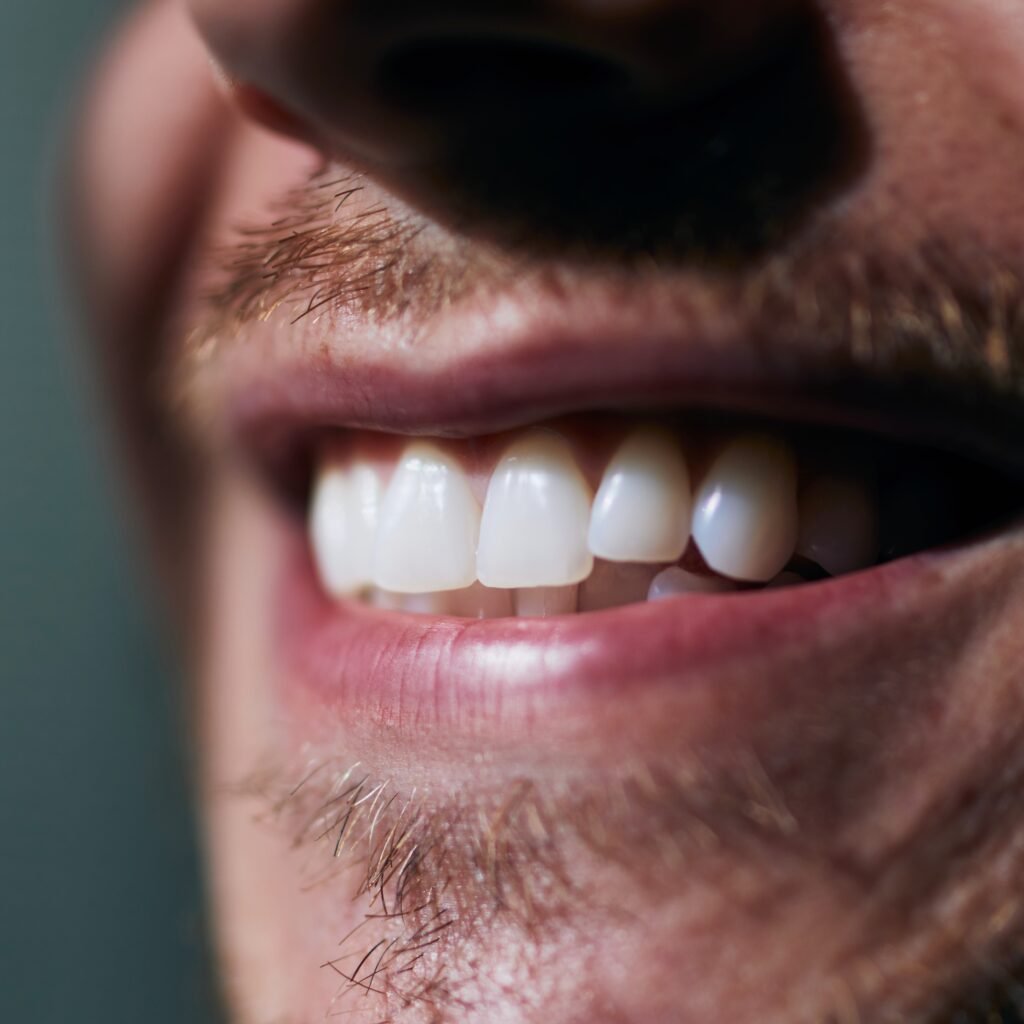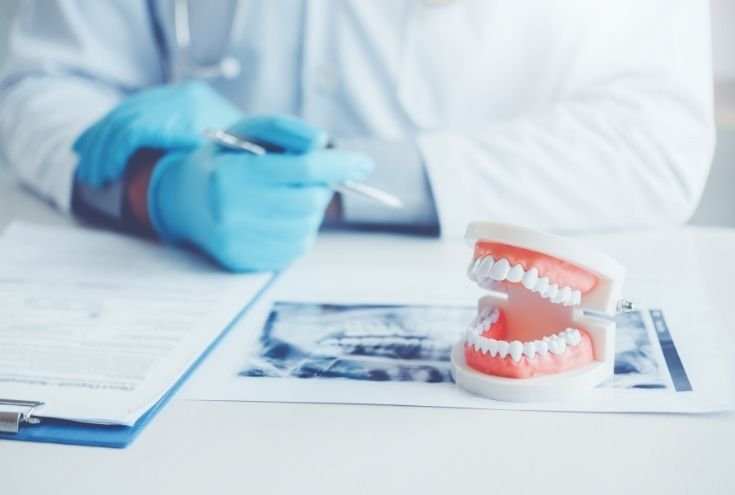

Periodontics
According to research, 90% of adults in the UK have some form of gum disease. Whether it be a minor case of gingivitis all the way up to severe periodontitis. It can be prevented by visiting your dentist and dental hygienist as well as maintaining good oral hygiene habits and routines including regular brushing and flossing. If you have let your oral health slip, there is no need to panic as our Specialist Periodontist can help prevent your gum disease from becoming more severe.
A periodontist is a dentist who has received specialist training in the maintenance of gums and focuses on mitigating and treating gum disease. Periodontics categorises practitioners who specialise in preventing gum problems and treating them when they occur. Periodontics is a dental specialty that focuses on mitigating and treating gum disease.
Periodontics
According to research, 90% of adults in the UK have some form of gum disease. Whether it be a minor case of gingivitis all the way up to severe periodontitis. It can be prevented by visiting your dentist and dental hygienist as well as maintaining good oral hygiene habits and routines including regular brushing and flossing. If you have let your oral health slip, there is no need to panic as our Specialist Periodontist can help prevent your gum disease from becoming more severe.
A periodontist is a dentist who has received specialist training in the maintenance of gums and focuses on mitigating and treating gum disease. Periodontics categorises practitioners who specialise in preventing gum problems and treating them when they occur. Periodontics is a dental specialty that focuses on mitigating and treating gum disease.

Periodontist
Periodontist
BEFORE & AFTERS
Gum Disease Treatment - Non-Surgical Therapy
Gum Sculpting / Crown Lengthening
Periodontal Plastic Surgery - Gum Grafts
Periodontics – Treating and Preventing Gum Disease
Healthy gums are the foundation of a healthy smile. Periodontics is the dental specialty that focuses on the prevention, diagnosis, and treatment of gum disease.
Understanding Gum Disease
Gum disease has three main stages:
- Gingivitis – early stage; gums may be sore, swollen, or bleed easily.
- Periodontitis – more advanced; requires specialist gum care.
- Advanced Periodontitis – severe damage that can lead to tooth loss.
Key warning signs include:
- Bad breath
- Swollen or bleeding gums
- Gum tenderness or discomfort
Prevention is key — left untreated, gum disease can lead to tooth loss and even affect your overall health.
Why Early Detection Matters
Gum disease can develop quietly without obvious pain or symptoms. That’s why regular visits to a specialist periodontist are so important. Early diagnosis allows for better, faster, and more comfortable results.
Your Consultation
When you see our specialist periodontist, we will:
- Review your medical history to find possible causes.
- Take x-rays to assess teeth and jaw health.
- Perform periodontal charting — measuring gum pockets and checking for bleeding.
- Create a tailored treatment plan.
Treating Gingivitis (Early Gum Disease)
If gum disease is caught early, gingivitis can often be reversed with:
- Professional plaque and tartar removal.
- Improved brushing and flossing at home.
- Ongoing hygiene appointments to maintain progress.
Treating Periodontitis (Advanced Gum Disease)
Once gum disease reaches the periodontitis stage, more specialised care is needed to:
- Stop infection and inflammation.
- Restore gum health.
- Prevent further damage and tooth loss.
Unhealthy gums can also increase the risk of heart disease, osteoporosis, diabetes, and certain cancers, so prompt treatment protects both your smile and your overall health.
Ongoing Maintenance
After treatment, we recommend regular maintenance sessions with a periodontist to keep your gums healthy. Once your gum health is stable, you can return to routine check-ups and dental hygiene visits.
Gentle, Effective, and Long-Lasting Care
Specialist periodontal treatments are painless when performed by an experienced clinician. At Holford Partners Curaden, our Specialist in Periodontics, Dr Stella Kourkouta, uses the latest tools, technology, and techniques to deliver effective, comfortable, and long-lasting results.
Protect your gums. Protect your smile.
Book an appointment with our Specialist Periodontist, Dr Stella Kourkouta and take the first step toward lifelong oral health.
If your periodontist catches your gum disease in the early stages then your treatment will involve a procedure called scaling and root surface debridement. This initial treatment requires a special technique of removing calculus and plaque form the root surfaces of the teeth and pockets. The aim is to stabilise the gum disease and allow for long term maintenance to keep it under control.
If your case is more advanced then your treatment may require multiple treatments and appointments. These can include laser treatment, surgical treatment and/or medication. Your periodontist will advise which is the best form(s) of treatment are required. It all depends on the extent of your gum disease. This will all be discussed in before you commence your periodontal treatment.
Root Surface Debridement – Non-Surgical Therapy
When gum disease or an issue is detected by your periodontist, root surface debridement may be required to treat your condition.
The build up of bacteria on the teeth’s roots can infect and cause harm to your gums and bone. This is known as gingivitis. If left untreated this can lead to a more severe form of gum disease know as periodontitis.
When your specialist periodontist diagnoses the bacterial build-up early, then a simple root debridement will be needed to deep clean below the gums.
This treatment used to cause mild to moderate pain and discomfort during and some hours after. However, at Holford Partners Curaden we use the latest technology and techniques to offer pain-free root cleaning for our patients.
After root debridement, your periodontist will recommend and show how to maintain excellent gum care habits that include regular check-ups to help prevent gum diseases and other problems moving forward.
Flap Surgery
Flap surgery is another form of surgery used in periodontics.
At the start of the procedure you will receive anaesthesia to make sure the procedure is 100% pain-free. Next, the periodontal surgeon will make small precise cuts in your gums to expose a larger area of the root surface for a deep clean of the teeth roots.
Your periodontal surgeon will remove bacteria and tartar from your teeth. Once the deep teeth clean is complete the periodontist will suture the gums back to fit firmly around the teeth.
You will be given post operative instructions and aftercare medication including painkillers and antibiotics.
SPECIALIST PERIODONTAL TREATMENT – Exclusively with Dr Stella Kourkouta
Crown lengthening is a surgical periodontal procedure usually performed by a specialist periodontist to reduce the gum tissue and bone to expose more of the tooth structure. Hence resulting in a longer looking tooth for patients with short teeth. There are two types of crown lengthening surgical procedures. The first is for cosmetic reasons to reduce a gummy smile and the second is for function to increase the structural integrity of a tooth.
Crown Lengthening for Cosmetic Reasons
If you are concerned that your teeth are too short or you have a “gummy” smile that you would like to reduce, then our periodontist will be able to outline the procedures on offer to enhance your smile. You may have more tooth structure below the surface of your gums however it is covered by excessive gum tissue. The surgical procedure will give your smile more balanced proportions and reduce the amount of gum tissue present.
During the dental crown lengthening procedure, your periodontist will correct this by removing excess gum tissue and slightly reshape a the bone to expose more of the tooth surface. This can either be done to a single tooth to even out your gum line or to multiple teeth to provide a natural full smile.
Crown Lengthening for Functional Reasons
You may require crown lengthening if your dentist or periodontist requires a greater amount of tooth structure to support a crown or veneer to ensure a greater outcome. Your tooth may have decay or broken below the gum line or there may be insufficient tooth structure exposed for a restoration, such as a veneer, crown or bridge. The crown lengthening procedure will reduce the amount of bone and gum at the neck of the tooth to uncover more of the natural tooth so it can be restored.
SPECIALIST PERIODONTIC TREATMENT – Exclusively with Dr Stella Kourkouta
Periodontal plastic surgery is more commonly known as gum grafting and it can help you successfully deal over exposed teeth roots due to excessive gum recession which can cause extreme sensitivity and also improve the appearance of your smile.
Your gums can gradually change or even diminish. There are various causes, which include gum recession due to gingivitis or periodontitis and the loss of a single tooth or multiple teeth which if left without a replacement tooth then the gums and bone will shrink.
A gum graft is the surgical extraction of soft tissue, taken from one area such as the palate and strategically implanted in the area of depleted soft tissue. Gum grafts will help rectify gum deformities and other problems such as periodontitis. They will also help cover exposed roots, gum recession, prevent bone loss and help to reduce extreme tooth sensitivity associated with root exposure. Practically the use of soft tissue grafts can increase the zone of keratinised tissue and cover exposed roots. Periodontal plastic surgery can also be used for papilla regeneration around implants and ridge augmentation.
We use the latest technology and techniques and by using magnifying loupes, dental microscopes and microblades allows us to greatly improve the success rate and results whilst also minimising any discomfort after surgery.
The replacement of lost gum tissue will help restore the natural gum line of your teeth which will help to enhance your smile. Gum augmentation or replacement can be done by gum tissue grafts or by the relocating of the existing tissue into a better position around the tooth.
How much does periodontal treatment cost?
The prices will vary depending on the type of periodontal treatment required and the severity of your case. The main goal of treatment is to control the infection. The number and types of treatment will vary, depending on the extent of the gum disease. Any type of treatment requires that the patient keep up good daily care and maintenance at home. The periodontist may also suggest changing certain behaviors, such as quitting smoking, as a way to improve your treatment results.
PERIODONTAL CONSULTATION (Including bitewing x-rays, full charting and measurements) ……………….. £325
NON-SURGICAL PERIO ROOT DEBRIDEMENT ……………….. from £395 – £1950
CROWN LENGTHENING ……………….. from £1500
GUM GRAFTING (Periodontal Plastic Surgery) ……………….. from £1500
Periodontist
BEFORE & AFTERS
Gum Disease Treatment - Non-Surgical Therapy
Gum Sculpting / Crown Lengthening
Periodontal Plastic Surgery - Gum Grafts
Periodontist
Who offers this treatment?

Affordable Treatment: Periodontal Services
Your gums need special attention when it comes to disease prevention and cure.
You need regular check-ups to ensure you have no disease and that you can practice excellent habits.
But, if during a check-up, the dentist finds an issue, there are services available that are focused on gum disease treatment.

Are You In Pain Or Discomfort?
We advocate prevention to avoid gum problems, but if you are experiencing pain or discomfort right now, we can remove that problem for you as early as possible. You don’t need to wait until your next check-up.


Are You In Pain Or Discomfort?
We advocate prevention to avoid gum problems, but if you are experiencing pain or discomfort right now, we can remove that problem for you as early as possible. You don’t need to wait until your next check-up.

Disease Prevention,
Early Detection
& Treatment
PERIODONTAL CHECK-UPS
Visit your periodontist regularly to keep your gums in check and get advice on how to maintain you gums so you can prevent any gum diseases and problems happening in the future.
GUM MAINTENANCE
Your periodontist will recommend you to have regular cleans and use specific interdental brushes and methods that will help you maintain your gum and oral health to prevent diseases.
GUM DISEASE TREATMENT
Regular visits will allow your periodontist to detect any problems and fix your gum disease as early as possible to prevent your gingivitis from becoming a more severe case of periodontitis.
Disease Prevention,
Early Detection
& Treatment
PERIODONTAL CHECK-UPS
Visit your periodontist regularly to keep your gums in check and get advice on how to maintain you gums so you can prevent any gum diseases and problems happening in the future.
GUM MAINTENANCE
Your periodontist will recommend you to have regular cleans and use specific interdental brushes and methods that will help you maintain your gum and oral health to prevent diseases.
GUM DISEASE TREATMENT
Regular visits will allow your periodontist to detect any problems and fix your gum disease as early as possible to prevent your gingivitis from becoming a more severe case of periodontitis.
Frequently Asked Questions
Gum disease is most often caused by plaque – a sticky film of bacteria that builds up on teeth. Poor oral hygiene, smoking, certain health conditions, and genetics can all increase your risk.
Common signs include bleeding gums, bad breath, gum swelling, gum recession, tooth sensitivity, and in more advanced cases, loose teeth.
In its earliest stage (gingivitis), gum disease can be reversed with professional cleaning and improved home care. Once it progresses to periodontitis, it can’t be reversed, but it can be managed and stabilised with specialist treatment.
There several ways in which you can prevent periodontitis and other forms of infections. By following the measures below, you will ensure good and effective oral hygiene.
– Attend regular dental examinations as recommended by your dentist.
– Brush the gum line and each tooth twice daily (before bed and on one other occasion). Brush for at least 2 minutes. You should ask which toothbrush is best for you to use and the technique needed.
– Clean daily between the teeth before brushing, using floss in tight spaces and interdental brushes for larger spaces.
– Use a fluoridated toothpaste with at least 1350ppm Fluoride, spit out after brushing but do not rinse to maintain fluoride concentration.
– Do not smoke.
– Reduce the frequency and intake of sugary foods and drinks.
You can keep your gums and teeth healthy by:
- Brushing your teeth twice a day with a fluoride toothpaste.
- Flossing regularly to remove plaque from between teeth. Similarly you can use interdental brushes or a water flosser as recommended by your dental professional.
- Visiting the dentist routinely for a check-up and professional cleaning.
- Quitting smoking/vaping.
Mostly likely yes. It mean you potentially have a cavity or you may have a form of gum disease known as gingivitis. A toothache can come from an infection that might include both your teeth and gums.
No. Modern periodontal treatments are performed under local anaesthetic for comfort. Most patients experience little to no discomfort during the procedure.
Yes. Research links gum disease to heart disease, diabetes, stroke, and other health problems. Treating gum disease can help protect your general health as well as your smile.





